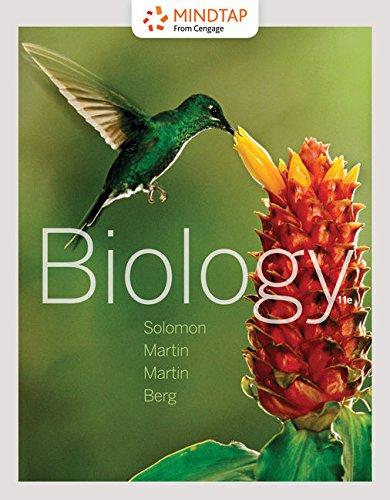
Mindtap Biology, 1 Term (6 Months) Printed Access Card For Solomon/martin/martin/berg's Biology, 11th
11th Edition
ISBN: 9781337393096
Author: Eldra Solomon, Charles Martin, Diana W. Martin, Linda R. Berg
Publisher: Cengage Learning
expand_more
expand_more
format_list_bulleted
Concept explainers
Question
Chapter 30, Problem 9TYU
Summary Introduction
Concept introduction: Animal phylogeny is a rapidly changing field. Biologists mostly depend on the fossils to compare the similarities of body plan and the pattern of development to determine the evolutionary relationships among various animal groups. Throughout evolutionary history, there are various changes seen in body plans. These changes in the body plan provide clues to animal relationships.
Expert Solution & Answer
Trending nowThis is a popular solution!

Students have asked these similar questions
The following table is from Kumar et. al. Highly Selective Dopamine D3 Receptor (DR) Antagonists and Partial Agonists Based on Eticlopride and the D3R Crystal Structure: New Leads for Opioid Dependence Treatment. J. Med Chem 2016.
The following figure is from Caterina et al. The capsaicin receptor: a heat activated ion channel in the
pain pathway. Nature, 1997. Black boxes indicate capsaicin, white circles indicate resinferatoxin.
You are a chef in a fancy new science-themed restaurant. You have a recipe that calls for 1 teaspoon of resinferatoxin, but you feel uncomfortable serving foods with "toxins" in them. How much capsaicin could you substitute instead?
What protein is necessary for packaging acetylcholine into synaptic vesicles?
Chapter 30 Solutions
Mindtap Biology, 1 Term (6 Months) Printed Access Card For Solomon/martin/martin/berg's Biology, 11th
Ch. 30.1 - Prob. 1LOCh. 30.1 - Prob. 1CCh. 30.2 - Compare the advantages and disadvantages of life...Ch. 30.2 - What are some advantages of marine environments...Ch. 30.2 - Prob. 2CCh. 30.3 - Prob. 3LOCh. 30.3 - Prob. 1CCh. 30.3 - Prob. 2CCh. 30.3 - Prob. 3CCh. 30.4 - Describe how biologists use morphology (including...
Ch. 30.4 - Cite specific examples of how data from molecular...Ch. 30.4 - Prob. 1CCh. 30.4 - What are some differences between protostomes and...Ch. 30.4 - Prob. 3CCh. 30 - Which of the following is not a characteristic of...Ch. 30 - Which of the following is not an adaptation to...Ch. 30 - The Cambrian radiation (a) occurred during the...Ch. 30 - The germ layer that gives rise to the outer...Ch. 30 - Prob. 5TYUCh. 30 - Prob. 6TYUCh. 30 - Prob. 7TYUCh. 30 - Prob. 8TYUCh. 30 - Prob. 9TYUCh. 30 - Prob. 10TYUCh. 30 - Prob. 11TYUCh. 30 - EVOLUTION LINK Examine the cladogram in Figure...Ch. 30 - Prob. 13TYUCh. 30 - Prob. 14TYU
Knowledge Booster
Learn more about
Need a deep-dive on the concept behind this application? Look no further. Learn more about this topic, biology and related others by exploring similar questions and additional content below.Similar questions
- 1. Match each vocabulary term to its best descriptor A. affinity B. efficacy C. inert D. mimic E. how drugs move through body F. how drugs bind Kd Bmax Agonist Antagonist Pharmacokinetics Pharmacodynamicsarrow_forward50 mg dose of a drug is given orally to a patient. The bioavailability of the drug is 0.2. What is the volume of distribution of the drug if the plasma concentration is 1 mg/L? Be sure to provide units.arrow_forwardDetermine Kd and Bmax from the following Scatchard plot. Make sure to include units.arrow_forward
- Choose a catecholamine neurotransmitter and describe/draw the components of the synapse important for its signaling including synthesis, packaging into vesicles, receptors, transporters/degradative enzymes. Describe 2 drugs that can act on this system.arrow_forwardThe following figure is from Caterina et al. The capsaicin receptor: a heat activated ion channel in the pain pathway. Nature, 1997. Black boxes indicate capsaicin, white circles indicate resinferatoxin. a) Which has a higher potency? b) Which is has a higher efficacy? c) What is the approximate Kd of capsaicin in uM? (you can round to the nearest power of 10)arrow_forwardWhat is the rate-limiting-step for serotonin synthesis?arrow_forward
arrow_back_ios
SEE MORE QUESTIONS
arrow_forward_ios
Recommended textbooks for you
 Concepts of BiologyBiologyISBN:9781938168116Author:Samantha Fowler, Rebecca Roush, James WisePublisher:OpenStax College
Concepts of BiologyBiologyISBN:9781938168116Author:Samantha Fowler, Rebecca Roush, James WisePublisher:OpenStax College Biology 2eBiologyISBN:9781947172517Author:Matthew Douglas, Jung Choi, Mary Ann ClarkPublisher:OpenStax
Biology 2eBiologyISBN:9781947172517Author:Matthew Douglas, Jung Choi, Mary Ann ClarkPublisher:OpenStax
 Biology (MindTap Course List)BiologyISBN:9781337392938Author:Eldra Solomon, Charles Martin, Diana W. Martin, Linda R. BergPublisher:Cengage Learning
Biology (MindTap Course List)BiologyISBN:9781337392938Author:Eldra Solomon, Charles Martin, Diana W. Martin, Linda R. BergPublisher:Cengage Learning Biology: The Dynamic Science (MindTap Course List)BiologyISBN:9781305389892Author:Peter J. Russell, Paul E. Hertz, Beverly McMillanPublisher:Cengage Learning
Biology: The Dynamic Science (MindTap Course List)BiologyISBN:9781305389892Author:Peter J. Russell, Paul E. Hertz, Beverly McMillanPublisher:Cengage Learning Biology: The Unity and Diversity of Life (MindTap...BiologyISBN:9781305073951Author:Cecie Starr, Ralph Taggart, Christine Evers, Lisa StarrPublisher:Cengage Learning
Biology: The Unity and Diversity of Life (MindTap...BiologyISBN:9781305073951Author:Cecie Starr, Ralph Taggart, Christine Evers, Lisa StarrPublisher:Cengage Learning

Concepts of Biology
Biology
ISBN:9781938168116
Author:Samantha Fowler, Rebecca Roush, James Wise
Publisher:OpenStax College

Biology 2e
Biology
ISBN:9781947172517
Author:Matthew Douglas, Jung Choi, Mary Ann Clark
Publisher:OpenStax


Biology (MindTap Course List)
Biology
ISBN:9781337392938
Author:Eldra Solomon, Charles Martin, Diana W. Martin, Linda R. Berg
Publisher:Cengage Learning

Biology: The Dynamic Science (MindTap Course List)
Biology
ISBN:9781305389892
Author:Peter J. Russell, Paul E. Hertz, Beverly McMillan
Publisher:Cengage Learning

Biology: The Unity and Diversity of Life (MindTap...
Biology
ISBN:9781305073951
Author:Cecie Starr, Ralph Taggart, Christine Evers, Lisa Starr
Publisher:Cengage Learning
From Sea to Changing Sea | Early Life in the Oceans || Radcliffe Institute; Author: Harvard University;https://www.youtube.com/watch?v=Ac0TmDf5Feo;License: Standard youtube license